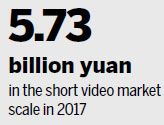National campaign launched to fight piracy
Operation Jianwang to focus on unauthorized streaming of short videos
Multiple authorities in copyright enforcement last week launched Operation Jianwang, an annual national campaign against online piracy, which this year focuses on short videos, animation and articles.
One of the major targets, short videos - generally less than five minutes - have been under fire for frequent infringements.
|
Short videos displayed at the 22nd China International Software Expo, which was held in Beijing from June 29 to July 2, attract visitors' attention. Provided to China Daily |
A report on China's online copyright industry development, released by an industry research arm of the National Copyright Administration in April, showed that last year witnessed "explosive growth" in both user numbers and streaming in the short video sector.
User numbers surged 115 percent year-on-year to more than 410 million across the country in 2017, with the market scale quadrupling from a year earlier to 5.73 billion yuan ($842.77 million).
The short video market is projected to top 35 billion yuan in 2020, according to the report.
Driven by such a huge market, some video makers and portals have ignored copyright rules, copying or adapting others' creations without authorization, industry observers said.
The infringements in the sector include unauthorized copy, performance or distribution of movies, music, photos and written works; illegal adaptation or distortion of original copyrighted products in the name of fair use; and abusive use of the safe harbor principle to violate copyright, Yu Cike, director of copyright management for the National Copyright Administration, said at a news conference on July 16.
The safe harbor principle is a common practice, which shields portals from liabilities if they pay due diligence in noticing and removing infringing items.
Short video portals and apps will be given priority supervision during the campaign. Once found involved in severe infringements, they will face the cancellation of their business certificates, Yu noted.
In response, major video portals and apps, including Kuaishou and Douyin, have told Chinese media that they will strengthen control and regulation of the uploaded contents.
The move is expected to affect the internet video streaming market in the short run, according to industrial insiders.
Copyright protection is the key for the industry to sustain its growth, according to Douyin.
The platform is exploring new technologies to identify infringements at efficient costs and on a large scale, its spokesperson said.
Copyright owners have the right to keep their products intact, Legal Evening News, a Beijing-based newspaper, quoted Wang Youyin, a managing partner of Beijing Shengyun Law Firm, as saying.

Unauthorized adaptation can constitute an infringement, even if the violator may not benefit from it, Wang noted.
Li Chen, a law professor at Renmin University, said at a forum earlier this month that with a change in online viewing preferences, short videos are becoming increasingly popular.
The boom of the market required comprehensive consideration of whether to apply the "fair use" principle, Li said.
"Many online short videos are not made for sheer self-entertainment, but to attract streaming, ads or rewards," she said. "Other factors such as the proportion of other's creation to an entire video should be taken into consideration.
"The licensing market concerning short video distribution also needs attention," she added.
Operation Jiangwang was initiated by the National Copyright Administration, the Cyberspace Administration, the Ministry of Industry and Information Technology and the Ministry of Public Security. This year, it will run for four months.
(China Daily 07/26/2018 page17)















